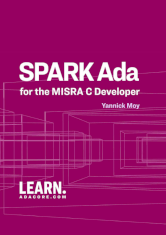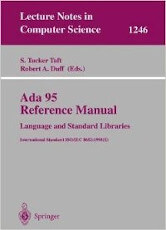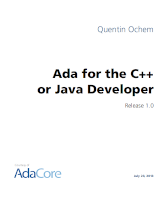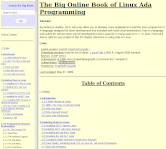9. SPARK Ada for the MISRA-C Developer by Yannick Moy

This book presents the SPARK technology — the SPARK subset of Ada and its supporting static analysis tools — through an example-driven comparison with the rules in the widely known MISRA C subset of the C language.
MISRA C appeared in 1998 as a coding standard for C; it focused on avoiding error-prone programming features of the C programming language rather than on enforcing a particular programming style.
The popularity of the C programming language, as well as its many traps and pitfalls, have led to the huge success of MISRA C in domains where C is used for high-integrity sofware.
Chapters cover:
- Enforcing Basic Program Consistency.
- Enforcing Basic Syntactic Guarantees.
- Enforcing Strong Typing.
- Initializing Data Before Use.
- Controlling Side Effects.
- Detecting Undefined Behavior.
- Detecing Unreachable Code and Dead Code.
10. Ada 95 Reference Manual
 This Ada 95 Reference Manual is essentially identical to the new International Standard ISO/IEC 8652:1995(E) for the Ada programming language.
This Ada 95 Reference Manual is essentially identical to the new International Standard ISO/IEC 8652:1995(E) for the Ada programming language.
The thorough technical revisions and extensions documented in this manual are built on broad participation from the international Ada community and generous support by leading institutions. Over 750 submitted revision requests were evaluated, and the resulting enhancements make Ada 95 an outstanding language. The flexibility of languages such as C++, modern features such as object orientation, and improved interfacing capabilities have been added to the reliable software engineering capabilities provided and proven for over a decade by the predecessor version Ada 83; furthermore, upward compatibility from Ada 83 to Ada 95 has been achieved.
Chapters cover:
Core Language
- General.
- Lexical Elements.
- Declarations and Types.
- Names and Expressions.
- Statements.
- Subprograms.
- Packages.
- Visibility Rules.
- Tasks and Synchronization.
- Program Structure and Compilation Issues.
- Exceptions.
- Generic Units.
- Representation Issues.
Annexes
- Predefined Language Environment.
- Interface to Other Languages.
- Systems Programming.
- Real-Time Systems.
- Distributed Systems.
- Information Systems.
- Numerics.
- Safety and Security.
- Obsolescent Features.
- Language-Defined Attributes.
- Language-Defined Pragmas.
- Implementation-Defined Characteristics.
- Glossary.
- Syntax Summary.
The whole package (wrapped in a compressed “tarfile” or “zip file”) may be freely copied and distributed, if accompanied by this statement, and provided that integral copies of all files are included (i.e. no change whatsoever is allowed).
11. Ada Programming by Wikibooks
 This book is an Ada tutorial covering the Ada 2005 and 2012 standards. If you’re a beginner you will learn the latest standard — if you are a seasoned Ada user you can see what’s new.
This book is an Ada tutorial covering the Ada 2005 and 2012 standards. If you’re a beginner you will learn the latest standard — if you are a seasoned Ada user you can see what’s new.
This book is intended for professional readers.
Text is available under the Creative Commons Attribution-ShareAlike License.
12. Ada for the C++ or Java Developer by Quentin Ochem
 Ada for the C++ or Java Developer offers the reader an overview of the Ada language using analogies to C++ and Java. These are the languages you’re already likely to know. No prior knowledge of Ada is assumed.
Ada for the C++ or Java Developer offers the reader an overview of the Ada language using analogies to C++ and Java. These are the languages you’re already likely to know. No prior knowledge of Ada is assumed.
If you’re working on an Ada project now and need more background, if you’re interested in learning to program in Ada, or if you need to perform an assessment of possible languages to be used for a new development, this guide is designed for you.
13. The Big Online Book Of Linux Ada Programming by Ken O. Burtch
 The Big Online Book Of Linux Ada Programming introduces ADAD programming in Linux using GNAT, the GNU Ada compiler. It covers basic software development on Linux, a review of the core Ada 95 language, and an introduction to designing programs that work with the Linux kernel and standard C libraries.
The Big Online Book Of Linux Ada Programming introduces ADAD programming in Linux using GNAT, the GNU Ada compiler. It covers basic software development on Linux, a review of the core Ada 95 language, and an introduction to designing programs that work with the Linux kernel and standard C libraries.
According to studies, GCC Ada may allow you to develop Linux applications in half the time compared to C. A language designed for team development and included with most Linux distributions, Ada is a language well-suited for serious open source development and is superior in many ways to C++ or Java. Find out if Ada is right for your project in this 20 chapter reference to using Ada on Linux.
Pages in this article:
Page 1 – Ada 95: The Lovelace Tutorial and more books
Page 2 – Ada Distilled and more books
Page 3 – SPARK Ada for the MISRA-C Developer and more books
All books in this series:
| Free Programming Books | |
|---|---|
| Ada | ALGOL-like programming language, extended from Pascal and other languages |
| Agda | Dependently typed functional language based on intuitionistic Type Theory |
| Arduino | Inexpensive, flexible, open source microcontroller platform |
| Assembly | As close to writing machine code without writing in pure hexadecimal |
| Awk | Versatile language designed for pattern scanning and processing language |
| Bash | Shell and command language; popular both as a shell and a scripting language |
| BASIC | Beginner’s All-purpose Symbolic Instruction Code |
| C | General-purpose, procedural, portable, high-level language |
| C++ | General-purpose, portable, free-form, multi-paradigm language |
| C# | Combines the power and flexibility of C++ with the simplicity of Visual Basic |
| Clojure | Dialect of the Lisp programming language |
| ClojureScript | Compiler for Clojure that targets JavaScript |
| COBOL | Common Business-Oriented Language |
| CoffeeScript | Transcompiles into JavaScript inspired by Ruby, Python and Haskell |
| Coq | Dependently typed language similar to Agda, Idris, F* and others |
| Crystal | General-purpose, concurrent, multi-paradigm, object-oriented language |
| CSS | CSS (Cascading Style Sheets) specifies a web page’s appearance |
| D | General-purpose systems programming language with a C-like syntax |
| Dart | Client-optimized language for fast apps on multiple platforms |
| Dylan | Multi-paradigm language supporting functional and object-oriented coding |
| ECMAScript | Best known as the language embedded in web browsers |
| Eiffel | Object-oriented language designed by Bertrand Meyer |
| Elixir | Relatively new functional language running on the Erlang virtual machine |
| Erlang | General-purpose, concurrent, declarative, functional language |
| F# | Uses functional, imperative, and object-oriented programming methods |
| Factor | Dynamic stack-based programming language |
| Forth | Imperative stack-based programming language |
| Fortran | The first high-level language, using the first compiler |
| Go | Compiled, statically typed programming language |
| Groovy | Powerful, optionally typed and dynamic language |
| Haskell | Standardized, general-purpose, polymorphically, statically typed language |
| HTML | HyperText Markup Language |
| Icon | Wide variety of features for processing and presenting symbolic data |
| J | Array programming language based primarily on APL |
| Java | General-purpose, concurrent, class-based, object-oriented, high-level language |
| JavaScript | Interpreted, prototype-based, scripting language |
| Julia | High-level, high-performance language for technical computing |
| Kotlin | More modern version of Java |
| LabVIEW | Designed to enable domain experts to build power systems quickly |
| LaTeX | Professional document preparation system and document markup language |
| Lisp | Unique features - excellent to study programming constructs |
| Logo | Dialect of Lisp that features interactivity, modularity, extensibility |
| Lua | Designed as an embeddable scripting language |
| Markdown | Plain text formatting syntax designed to be easy-to-read and easy-to-write |
| Objective-C | Object-oriented language that adds Smalltalk-style messaging to C |
| OCaml | The main implementation of the Caml language |
| Pascal | Imperative and procedural language designed in the late 1960s |
| Perl | High-level, general-purpose, interpreted, scripting, dynamic language |
| PHP | PHP has been at the helm of the web for many years |
| PostScript | Interpreted, stack-based and Turing complete language |
| Prolog | A general purpose, declarative, logic programming language |
| PureScript | Small strongly, statically typed language compiling to JavaScript |
| Python | General-purpose, structured, powerful language |
| QML | Hierarchical declarative language for user interface layout - JSON-like syntax |
| R | De facto standard among statisticians and data analysts |
| Racket | General-purpose, object-oriented, multi-paradigm, functional language |
| Raku | Member of the Perl family of programming languages |
| Ruby | General purpose, scripting, structured, flexible, fully object-oriented language |
| Rust | Ideal for systems, embedded, and other performance critical code |
| Scala | Modern, object-functional, multi-paradigm, Java-based language |
| Scheme | A general-purpose, functional language descended from Lisp and Algol |
| Scratch | Visual programming language designed for 8-16 year-old children |
| SQL | Access and manipulate data held in a relational database management system |
| Standard ML | General-purpose functional language characterized as "Lisp with types" |
| Swift | Powerful and intuitive general-purpose programming language |
| Tcl | Dynamic language based on concepts of Lisp, C, and Unix shells |
| TeX | Markup and programming language - create professional quality typeset text |
| TypeScript | Strict syntactical superset of JavaScript adding optional static typing |
| Vala | Object-oriented language, syntactically similar to C# |
| VHDL | Hardware description language used in electronic design automation |
| VimL | Powerful scripting language of the Vim editor |
| XML | Rules for defining semantic tags describing structure ad meaning |
